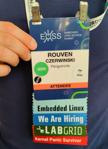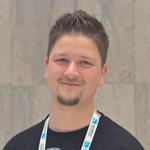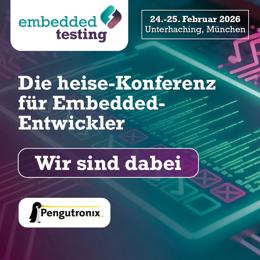Embedded Linux Conference Europe 2023: Our Contributions
This year the Embedded Linux Conference Europe (ELCE) is back in Prague! Pengutronix, again, is on a field trip with 15 colleges to attend the conference. The ELCE is one of the big conferences where the Embedded Linux Community meets during the year. This time the ELCE is part of the Embedded Open Source Summit (EOSS): a new conference with only embedded topics and without cloud- or crypto-tracks.
In this blog post we showcase the talks our colleagues will present at the ELCE. (Links to recordings will be added once the recordings are available.)
Oleksij Rempel: Braiding Wires Into the Linux Network Stack - Recent Work on Embedded Networking
Over the last few months, Oleksij Remepel has spent some time extending the Linux kernel's network infrastructure for embedded use cases - this includes, industrial, medical and automotive devices. As usual, any driver development starts from the basics and goes to advanced topics. The driver developer starts with the default hardware settings and makes them work. For example, with a Gigabit Ethernet controller, the first use case is a 1000BaseT full duplex link. While this works for most applications, some embedded use cases have special requirements. This talk will look into topics like: Energy Efficient Ethernet (EEE), Single Pair Ethernet (SPE), diagnostics and many more.
Lucas Stach: Why Are GPUs (Not) Fast - A Trip Through the Driver Stack
GPUs are often called accelerators and everybody tells us that they are supposed to make all things graphical go really fast. So why do they sometimes fall short of expectations and is there something we can do about it? This talk will first give a brief introduction to GPU hardware and how it differs from the traditional CPU. It will then work its way up through the different parts of the GPU driver stack until reaching the user visible APIs like EGL, OpenGL and Vulkan. The audience will gain a basic understanding on how the GPU hardware and drivers work and how to best utilize them both. Understanding the driver stack below the sometimes very abstract user APIs will help attendees of this talk to avoid performance pitfalls and utilize more of the acceleration potential when writing applications using the GPU. They will also gain a understanding how the graphics stack ties into the greater Linux ecosystem.
Johannes Zink: Do the Time Warp – the Rocky Horror PTP Show: Verification of Network Time Synchronization in the Real World
Many realtime network applications require tight time synchronizations between the different nodes in a network. The Precision Time Protocol PTP can provide clock synchronization down to the nanosecond range. In order to achieve such tight synchronization, hardware timestamping of PTP packets is used, for which the Linux kernel provides the kernel PTP hardwareclock infrastructure, while linuxptp implements the PTP protocol stack in userspace. Proper configuration of the components involved and the setup of the PTP daemons and hardware can be a difficult task, because even minor configuration issues have a huge impact on the overall performance. After a short introduction into PTP and synchronization of PTP hardware clocks, this talk introduces different methods for measuring clock synchronization and compares their advantages and disadvantages. Using examples from real world projects, this talk will show common pitfalls when starting to set up new PTP projects and how to avoid them. Last but not least, this talk will show misleading software debug outputs, time jumping back and forth, and many more fun effects you can encounter when setting up PTP in your network for the first time and how to debug these issues.
Weiterführende Links
Pengutronix bei der Embedded Testing 2026
Pengutronix ist in diesem Jahr wieder Partner der der Embedded Testingu nd ist dort sowohl mit einem Stand als auch mit einem Vortrag vertreten. Die Embedded Testing findet am 24. und 25. Februar 2026 in Unterhaching bei München statt.Pengutronix at FOSDEM and OE Workshop 2026
On January 31st and Febuary 1st 2026 it is once again time for waffles, Belgian beer and Open Source: FOSDEM will take place at ULB in Brussels. With over 8k hackers, FOSDEM is the biggest and most important Open Source conference in Europe. One other event riding the wave of FOSDEM is the the OpenEmbeddedWorkshop. The full list of co-located events is here. We are participating in both FOSDEM and OE Workshop and are looking forward to many interesting discussions with developers of different Open Source software components – be it the Linux kernel, Yocto, Labgrid, Debian, and others...
GStreamer Conference 2025
This years GStreamer conference was held at the end of Oktober in London, UK. Since GStreamer is our goto-framework for multimedia applications, Michael Olbrich and me were attending this years conference to find out what's new in GStreamer and get in touch with the community.
Pengutronix at Open Source Summit Europe and Embedded Linux Conference Europe
The Embedded Linux Conference Europe is Pengutronix' most important conference of the year. It is a good place to meet new faces in the embedded community, discuss current topics and future developments with maintainers and developers - and of course: have a beer with old friends. As usual, many Pengutronix colleagues will attend: this year we'll have a 14 person team on site. So watch out for our T-shirts and hoodies and and feel free to chat with us.
Embedded Linux Conference Europe 2023: Our Recommendations
Last month Pengutronix was present at the Embedded Open Source Summit (EOSS) in Prague. Thanks to all to all speakers for sharing your knowledge! In this blog post we want to shine a spotlight at a few talks that we found especially interesting. (Links to recordings will be added once the recordings are available.)
rsc's Diary: ELC-E 2022 - Tag 4
Freitag war der letzte Tag der ELC-E 2022 und somit auch der Tag des traditionellen ELC-E Closing Games. Tim Bird berichtete gewohnt kurzweilig über den aktuellen Stand der Embedded Linux World (Universe?) Domination. Und natürlich gab es auch am letzten Tag einige interessante Vorträge.











